人教版七年级上册英语《unit5doyouhaveasoccerballsectiona》课时练习
人教版英语七上 U5 Do you have a soccer ball 讲义

Unit5 Do you have a soccer ball?一、重点词汇及拓展1. have v.(1) 有e.g. I have a pen. 我有一只钢笔。
(2) 吃;喝e.g. I have breakfast every day. 我每天吃早饭。
(3) 经历e.g. have a good time 玩得开心;过得愉快(4) 上课e.g. We have English lessons every day. 我们每天上英语课。
(5) 举办e.g. Mark has a party. 马克举办了一个派对。
(6) 得…病e.g. He has a cold and a headache. 他感冒和头疼。
2. let v.允许;让let’s = let us 让我们let sb. do sth. 让某人做某事let sb. not do sth. 让某人不要做某事e.g. Let’s have a party tonight! 让我们今晚举办一个派对吧!make sb. do sth. 使某人做某事e.g. The movie makes me miss my mother. 这部电影使我怀念我的妈妈。
3. go v.去;走go to +地点去某地go to school 去学校go here/there/home 去这儿/去那/回家go shopping 去购物go swimming 去游泳go hiking 去远足go skating 去轮滑go boating 去划船4. lateadj. 迟的;晚的be late for school 上学迟到be late for class 上课迟到1be late for work 上班迟到adv. 迟地;晚地later adv. 后来;以后e.g. Three days later, he found his father. (句中有段时间+later,句子用一般过去时)三天后,他找到了他的爸爸。
人教版英语七年级上册Unit5 Do you have a soccer ball_ GF-3c教案

第一章: Unit5 Do you have a soccer ball?教案课题学习目标一:进一步学习通过运用have对物品的所属进行提问以及应答。
学习目标二:继续学会do和does引导的一般疑问句,理解并掌握英语句子中的人称和数,掌握并熟练运用下列句型。
学习目标三:能用Let’s…句型来提建议。
Ⅰ. RevisionLet the Ss work in groups (each group has three Ss).Review the sentence structures wehave learned.S1: Do you have a basketball?S2: Yes, I do.S1: Does she have a basketball?S3: Yes, she does.S1: Do you have a tennis bat?S3: No, I don't.S1: Does he have a tennis bat?S2: No, he doesn't.(设计目的:进一步巩固前面所学内容,并检查学生是否掌握。
做游戏是为了增强课堂活力,提高学生的学习兴趣。
)课中作业Does he have a baseball?——————————Ⅰ. Grammar Focus.1. Read Grammar Focus and finish off these sentences.① 你有一个棒球吗?____ you _____ a baseball?① 是的。
___, I ____. 不,没有。
_____, I ______.① 你有一个乒乓拍吗?____ you _____ a ping-pong _____?① 没有。
我有一个乒乓球。
_____, I ______. I _____ a ping-pong _______.① 她有一个球吗?____ she _____ a tennis?① 是,她有。
七年级英语上册 Unit 5 Do you have a soccer ball(单词+重点句型)语法解析
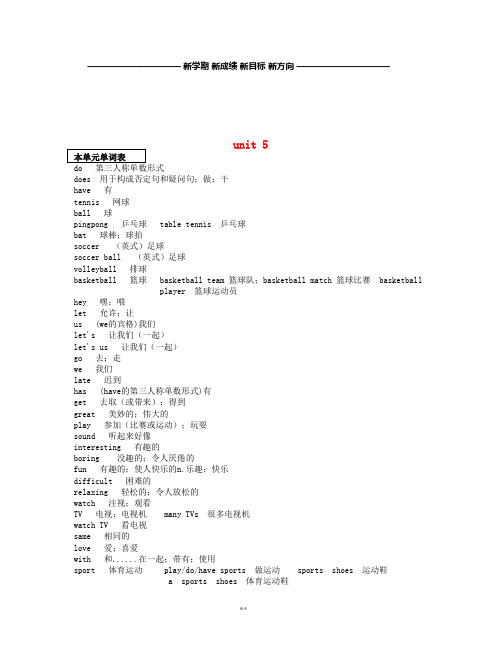
——————————新学期新成绩新目标新方向——————————unit 5does 用于构成否定句和疑问句;做;干have 有tennis 网球ball 球pingpong 乒乓球 table tennis 乒乓球bat 球棒;球拍soccer (英式)足球soccer ball (英式)足球volleyball 排球basketball 篮球 basketball team 篮球队;basketball match 篮球比赛 basketball player 篮球运动员hey 嘿;喂let 允许;让us (we的宾格)我们let's 让我们(一起)let's us 让我们(一起)go 去;走we 我们late 迟到has (have的第三人称单数形式)有get 去取(或带来);得到great 美妙的;伟大的play 参加(比赛或运动);玩耍sound 听起来好像interesting 有趣的boring 没趣的;令人厌倦的fun 有趣的;使人快乐的n.乐趣;快乐difficult 困难的relaxing 轻松的;令人放松的watch 注视;观看TV 电视;电视机 many TVs 很多电视机watch TV 看电视same 相同的love 爱;喜爱with 和......在一起;带有;使用sport 体育运动 play/do/have sports 做运动 sports shoes 运动鞋a sports shoes 体育运动鞋them (they的宾格)他(她、它)们only 只;仅like 喜欢;喜爱easy 容易的;不费力的after 在......以后class 班级;课(近义词:lessen);等级;类别;阶段classmate 同班同学 roommate 室友 workmate 同事 deskmate 同桌schoolmate 校友Bill 比尔(男名)on的用法,详见unit4【解析】on可以表示“通过;使用……方式”,后面通常接表示通信工具的名词。
Unit 5 Do you have a soccer ball 知识点归纳-七年级上册英语

人教版新目标七上英语单元知识点归纳Unit 5 Do you have a soccer ball?重点词汇tennis/'tenis/ n. 网球bat /bæt/ n. 球棒;球拍soccer ball (英式)足球volleyball/'vɔlibɔ:l/ n. 排球basketball/'ba:skitbɔ:l/ n. 篮球late/leit/ adj. 迟到great/greit/ adj. 美妙的;伟大的play/plei/ v. 参加(比赛或运动);玩耍sound/saund/ v. 听起来好像interesting/'intrəstiŋ/ adj. 有趣的boring/'bɔ:riŋ/ adj. 没趣的;令人厌倦的fun/fʌn/ adj. 有趣的;使人快乐的n.乐趣;快乐difficult/'difikəlt/ adj. 困难的relaxing/ri'læksiŋ/ adj. 轻松的;令人放松的watch/wɔtʃ/ v. 注视;观看same/seim/ adj. 相同的easy/'i:zi/ adj. 容易的;不费力的class/kla:s/ n. 班级;课classmate/'kla:smeit/ n. 同班同学重点短语:a tennis bat 一个网球拍play basketball 打篮球baseball bat 棒球棒have a soccer ball 有一个足球play soccer 踢足球with our friends 和我们的朋友一起have a ping-pong ball 有一个乒乓球play ping-pong 打乒乓球have a volleyball 有一个排球play volleyball 打排球at school 在校,上学play sports 做运动watch TV 看电视in my bag 在我的包里be late 迟到on TV 电视上必背典句:1. Do you have a soccer ball? 你有一个足球吗?2. Does he/she have a ping-pong ball?他/她有一个乒乓球吗?3. Do you play sports with your classmates? 你和你的同学一起做运动吗?4. Let’s play soccer together! 我们一起踢足球吧!5. How many sports do you like?你喜欢多少种运动?6. I like playing soccer and basketball. 我喜欢踢足球和打篮球。
人教版七年级上册英语Unit5Doyouhaveasoccerball
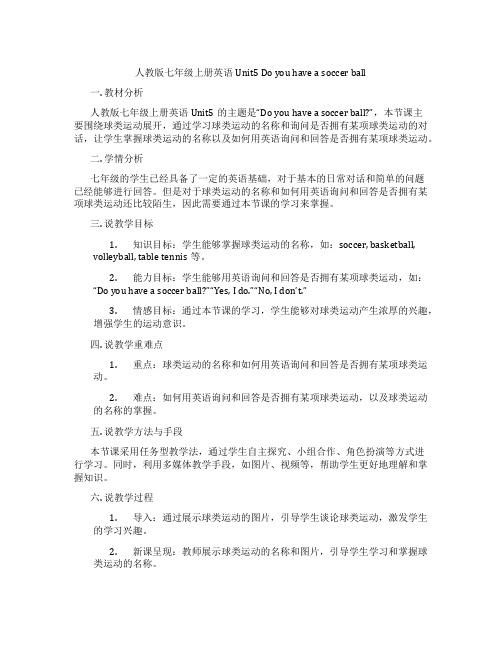
人教版七年级上册英语Unit5 Do you have a soccer ball一. 教材分析人教版七年级上册英语Unit5的主题是“Do you have a soccer ball?”,本节课主要围绕球类运动展开,通过学习球类运动的名称和询问是否拥有某项球类运动的对话,让学生掌握球类运动的名称以及如何用英语询问和回答是否拥有某项球类运动。
二. 学情分析七年级的学生已经具备了一定的英语基础,对于基本的日常对话和简单的问题已经能够进行回答。
但是对于球类运动的名称和如何用英语询问和回答是否拥有某项球类运动还比较陌生,因此需要通过本节课的学习来掌握。
三. 说教学目标1.知识目标:学生能够掌握球类运动的名称,如:soccer, basketball,volleyball, table tennis等。
2.能力目标:学生能够用英语询问和回答是否拥有某项球类运动,如:“Do you have a soccer ball?”“Yes, I do.”“No, I don’t.”3.情感目标:通过本节课的学习,学生能够对球类运动产生浓厚的兴趣,增强学生的运动意识。
四. 说教学重难点1.重点:球类运动的名称和如何用英语询问和回答是否拥有某项球类运动。
2.难点:如何用英语询问和回答是否拥有某项球类运动,以及球类运动的名称的掌握。
五. 说教学方法与手段本节课采用任务型教学法,通过学生自主探究、小组合作、角色扮演等方式进行学习。
同时,利用多媒体教学手段,如图片、视频等,帮助学生更好地理解和掌握知识。
六. 说教学过程1.导入:通过展示球类运动的图片,引导学生谈论球类运动,激发学生的学习兴趣。
2.新课呈现:教师展示球类运动的名称和图片,引导学生学习和掌握球类运动的名称。
3.对话练习:学生两人一组,模拟对话场景,练习如何用英语询问和回答是否拥有某项球类运动。
4.小组活动:学生分成小组,进行角色扮演,模拟真实场景,运用所学知识进行对话。
人教版英语七年级上册 Unit 5 Do you have a soccer ball_

Period 1(SectionA1a-2c)
Sentences Sports things
Do you have a…?soccer ball ping-pong ball
Yes, I do. /No I don’t.basketball ping-pong bat
5. Let Ss do the pair work according to the chart.
4.Do the listening,writing and reading practice.
5.Make conversations in pairs.
Consolidation
1.Let Ss practice the conversation : Does he/she have a/an… ?.Yes,he/she does./No, he/she does’t.
2.Tell Ss. to do the groupwork.
1.Practice making
conversations :Doeshe/she
have a/an… ?Yes,he/she does./No, he/she does’t.
2.Do some exercises.
3.Ss.work in groups to talk about the ownership in the room.
设计主题
Unit 5 Do you have a soccer ball?
Period 1 Section A 1a-2c
1.教学
内容
1)Words & expressions: have, soccer ball, tennis, racket, tennis racket, ping–pong, volleyball, basketball, bat.
人教版七年级上册英语-Unit5 Do you have a soccer ball section
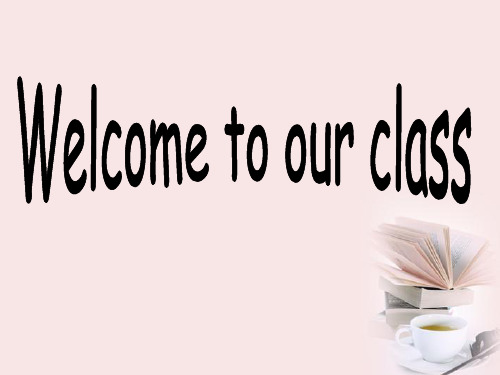
__D_o__e_s_
she + __h_a_v_e__ + 宾语?
he
3. He /She has……..是__陈_述__句____(疑 问句/ 陈述句).是第__三__人称__单_数___(单 数/复数)形式。用来表达 ___他_/_她_拥__有_某__物__.
4.陈述句的基本句型:
He + __h_a_s__ + 宾语。
Does he have a backpack?
Yes No
Yes, he does. He has a backpack.
No, he doesn't.
He doesn’t have a backpack.
第三人称单数提问用‘does’,陈述句是‘ha
Summary:
1.Does he/she/
2. Do they have……?用来询问__他__们__有__某_物__吗__?___。 是对第三人称的_复__数___(单数/复数)的提问。 肯定回答__Y_e_s_,_t_h_e_y_d_o_.__ 否定回答__N__o_, _th_e_y__d_o_n_’_t_. _
3.对某人是否拥有某物的提问的句型:
Names Do you have … Balls you have
Period 2 Grammar
Do you /they have a… ? Yes, I/they do. No, I/they don’t. Does he/she have a… ? Yes, he/she does. No, he/she doesn’t.
__T_h_e_y _
5. I / They don’t have ……..是否定句 ________(肯定句/否定句一).是第____ 人三称和第_____复数用某来人表没达有某物 ________________ 6. 基本句型:
人教(新目标)初中英语七年级上册 Unit 5 Do you have a soccer ball

Let’s play baseball.
Look at the pictures and make sentences.看图造句 e.g. Let’s play soccer
Let’s play volleyball. That sounds boring.
Let’s play soccer. Let’s play basketbal That sounds fun. That sounds relaxing
interesting
有趣的, 令人感兴趣的
Woo! It’s interesting.
fun
有趣的, 令人愉快的
Haha, it’s fun.
轻松的
relaxing
Ah! It’s relaxing.
difficult
困难的
968746232978³+78235768²×77869856343³ =
A: Let’s ... B: I don’t have... A: Well, let’s ... B: That sounds good.
×√
1b Listen and check (∨) the description
words you hear in 1a.
a. interesting ∨__ b. boring ∨__ c. difficult ∨__ d. relaxing __ e. fun ∨__
Let’s play baseball.
Let’s play ping-pong.
That sounds interesting. That sounds difficult.
A: Let’s play basketball. B: But I don’t have a basketball. A: Well, let’s play ping-pong. B: That sounds good.
七年级英语上册《Unit 5 Do you have a soccer ball》知识点 (新版)人教版

Unit 5 Do you have a soccer ball?1. Do you have......? Yes, I do. No, I don’t..你有……吗?是的,我有。
不,我没有。
Do they have......? Yes, they do. No, they don’t..Does he have......? Yes, he does. No, he doesn’t.Does she have......? Yes, she does. No, she doesn’t.在一般现在时中,句子的谓语动词若是实义动词,常借助助动词do或does来构成否定句或疑问句。
Does用于主语是第三人称单数的句子中,其他情况用do。
2. do/does1)作助动词,帮助构成一般现在时的否定句或疑问句,无意义。
Do you have a soccer ball? 你有足球吗?I don’t know. 我不知道。
Does Jim have a sister? 吉姆有妹妹吗?What does he like? 他喜欢什么?He doesn’t like English. 他不喜欢英语。
2) 作实义动词,“做,干”。
I do my homework every day. 我每天都做家庭作业。
Bob does his homework every day. 鲍勃每天都做家庭作业。
3) 在一般现在时中,do/does 可用来替代上文出现过的动词,以避免重复。
Do you have a soccer ball? 你有足球吗?Yes, I do. 是的,我有。
(do 代have)Does she have an eraser? Yes, she does.I don’t have a soccer ball, but my brother Alan d oes.我没有足球,但我的哥哥艾伦有。
3.Let’s do sth. “(让)我们做某事吧。
人教版七年级上册英语讲义 Unit 5 Do you have a soccer ball

Unit5 Do you have a soccer ball?讲义一、【重点单词】do /du:/助动词,帮助构成一般现在时的否定句或疑问句,无意义;实义动词“做,干”have /hæv/有tennis /'tenɪs/网球ball /bɔ:l/球ping-pong乒乓球bat /bæt/球棒;球拍soccer /'sɑ:kər/,/'sɒkə/(英式)足球soccer ball(英式)足球volleyball /'vɒlɪbɔ:l/排球basketball /'bɑ:skɪtbɔ:l/篮球let /let/允许;让us /ʌs/ (we的宾格)我们let's = let us让我们(一起)go /ɡəʊ/去;走we /wi:/我们late /leɪt/迟到has /hæz/有(have的第三人称单数形式)get /ɡet/去取(或带来);得到great /ɡreɪt/美妙的;伟大的play /pleɪ/参加(比赛或运动);玩耍sound /saʊnd/听起来好像interesting /'ɪntrəstɪŋ/有趣的;使人快乐的;乐趣;快乐difficult /'dɪfɪkəlt/困难的relaxing /rɪ'læksɪŋ/轻松的;令人放松的watch /wɒʧ/注视;观看TV /,ti:'vi:/电视same /seɪm/相同的love /lʌv/爱;喜爱with /wɪð/和...在一起;带有;使用sport /spɔ:(r)t/体育运动them /ðem/ /ðəm/他(她、它)们only /'əʊnlɪ/只;仅like /laɪk/喜欢;喜爱easy /'i:zi/容易的;不费力的after /'ɑ:ftə/在...之后class /klɑ:s/班级;课classmate /'klɑ:smeɪt/同班同学二、【重点短语】1. have a volleyball 有一个排球2. play volleyball/tennis 打排球/网球3. have a ping-pong/table tennis 有一个乒乓球4. play ping-pong/table tennis 打乒乓球5. with our friends 和我们的朋友一起6. have a football/soccer ball 有一个足球7. play football/soccer 踢足球8. at school 在校,在上学9. play sports 做运动10. play computer games 玩电脑游戏11. watch TV 看电视12. in the same school 在同一所学校13. after class 下课后14. go to school 去上学三、【重点句型】1. —Do you have a ping-pong bat? 你有一个乒乓球拍吗?—No, I don’t. 不,我没有。
人教版七年级上册英语Unit 5 Do you have a soccer ball
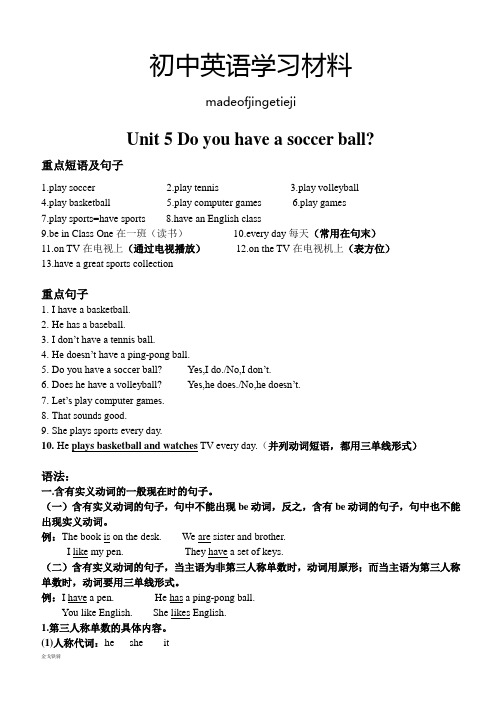
初中英语学习材料madeofjingetiejiUnit 5 Do you have a soccer ball?重点短语及句子1.play soccer2.play tennis3.play volleyball4.play basketball5.play computer games6.play games7.play sports=have sports 8.have an English class9.be in Class One在一班(读书)10.every day每天(常用在句末)11.on TV在电视上(通过电视播放)12.on the TV在电视机上(表方位)13.have a great sports collection重点句子1.I have a basketball.2.He has a baseball.3.I don’t have a tennis ball.4.He doesn’t h ave a ping-pong ball.5.Do you have a soccer ball? Yes,I do./No,I don’t.6.Does he have a volleyball? Yes,he does./No,he doesn’t.7.Let’s play computer games.8.That sounds good.9.She plays sports every day.10.He plays basketball and watches TV every day.(并列动词短语,都用三单线形式)语法:一.含有实义动词的一般现在时的句子。
(一)含有实义动词的句子,句中不能出现be动词,反之,含有be动词的句子,句中也不能出现实义动词。
例:The book is on the desk. We are sister and brother.I like my pen. They have a set of keys.(二)含有实义动词的句子,当主语为非第三人称单数时,动词用原形;而当主语为第三人称单数时,动词要用三单线形式。
人教版英语七年级上册Unit-5--do-you-have-a-soccer-ball

人教版英语七年级上册Unit 5 Do you have a soccer ball?单元教材分析本单元主要学习动词have的一般现在时的用法;使用do和does引导的一般疑问句的构成以及简单回答。
本单元围绕“和朋友一起欢度时光”这一话题安排了三个任务:一是列举所学的运动项目,从中挑选出各自喜欢的体育项目,并说明原因,目的是巩固并新学一些体育项目的名词;二是让学生互相询问所爱好的运动,并根据情况发出邀请,学会用have对物品的所属进行提问与回答,掌握用do和does引导的一般疑问句的构成及使用,了解用Let’s提建议的句型;三是写作,把任务一、二的完成情况写成日记,进一步复习、巩固所学的语言目标。
通过本单元的学习,学会用have对物品的所属进行提问与回答;学会用let’s…句型提建议;能够谈论自己喜欢哪些球类运动,不喜欢哪些球类运动及原因;能够谈论怎样和自己的朋友度过一段愉快的时光。
单元总体目标.1. 在询问对方是否有某物的对话中学会使用do和does引导的一般疑问句。
2. 学会使用描述性的形容词来评价事物。
3. 学会在对话中使用名词复数。
4. 学会用祈使句来向对方提出建议。
5. 学会用祈使句询问某人是否有某物。
6. 学会向他人提出建议的句子。
7. 学习了解一般现在时。
8. 在本单元中,通过阅读有关运动的文章和对话,使学生更加热爱体育活动并培养一种适合自己的体育爱好。
9.在小组活动中,培养学生团结协作精神。
本单元的主题是使用have对物品的所属进行提问及回答,以掌握行为动词在一般现在时中的构成和使用;同时引导学生使用所学的句型谈论自己在球类运动中的喜好。
行为动词在一般现在时的肯定句、否定句和一般疑问句中的构成和使用是初中英语教学中非常重要的内容,本单元知识的掌握程度将直接影响今后的英语学习。
学生在以前的学习中已经掌握了be动词在一般现在时中的构成和使用,在学生的头脑中也已经形成了一个模式,这种模式将直接影响学生对本单元知识内容的接受,所以教师在教学中一定要善于引导,以免学生养成不良习惯。
人教版七年级英语上册unit 5 Do you have a soccer ballSection

Do you have a/an …? Yes, I do. /No, I don’t. Where is it? It is…
3a Write each word in the correct place in the chart.
七年级上
Unit 5 Do you have a soccer ball?
Section A Period Two
Words review
great adj. 美妙的;伟大的 play v. 玩;打(球) sound v. 听起来 interesting adj. 有趣的
Lead-in 1
Let’s chant!!
pprinagc-tipcoentghbeacllo, ntovoe.rsations with A:yHomurmp…alrettn'sear.sk.
A: __D__o__ your friends have a
basketball?
B: Yes, they ___d_o__. They have two basketballs
Do you have a soccer ball? Do you have a soccer ball? Yes, I do. Yes I do. Do you have a volleyball? Do you have a volleyball? No, I don’t. No, I don’t.
Lead-in 2
Do you know where the 2014 FIFA World Cup was held?
七年级英语上册 Unit 5 Do you have a soccer ball讲义 (新版)人教新
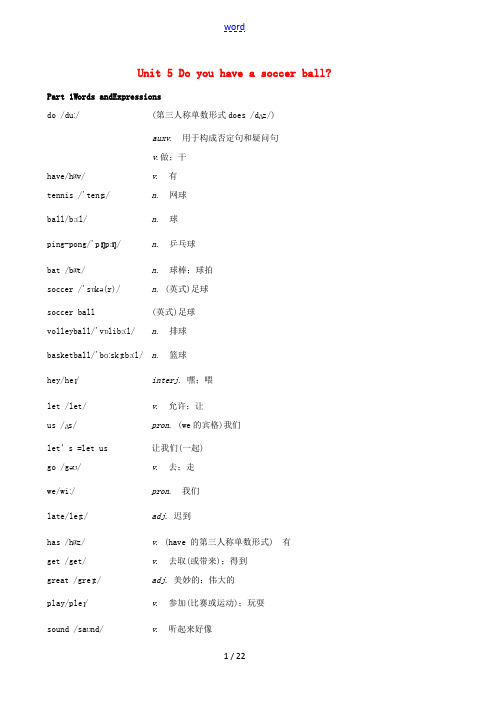
Unit 5 Do you have a soccer ball? Part 1Words andExpressionsdo /duː/ (第三人称单数形式does /dʌz/)auxv. 用于构成否定句和疑问句v.做;干have/hæv/ v. 有tennis /'tenɪs/ n. 网球ball/bɔːl/ n. 球ping-pong/'pɪŋpɔŋ/ n. 乒乓球bat /bæt/ n. 球棒;球拍soccer /'sɒkə(r)/ n. (英式)足球soccer ball (英式)足球volleyball/'vɒlibɔːl/ n. 排球basketball/'bɑːskɪtbɔːl/ n. 篮球hey/heɪ/ interj. 嘿;喂let /let/ v. 允许;让us /ʌs/ pron. (we的宾格)我们let’s =let us 让我们(一起)go /gəʊ/ v. 去;走we/wiː/ pron. 我们late/leɪt/ adj. 迟到has /hæz/ v. (have 的第三人称单数形式) 有get /get/ v. 去取(或带来);得到great /greɪt/ adj. 美妙的;伟大的play/pleɪ/ v. 参加(比赛或运动);玩耍sound /saʊnd/ v. 听起来好像interesting/'ɪntrəstɪŋ/ adj. 有趣的boring/'bɔːrɪŋ/ adj. 没趣的;令人厌倦的fun /fʌn/ adj. 有趣的;使人快乐的n. 乐趣;快乐difficult/'dɪfɪkəlt/ adj. 困难的relaxing/rɪ'læksɪŋ/ adj. 轻松的;令人放松的watch /wɒtʃ/ v. 注视;观看TV/,tiː'viː/ n. (=television /'telɪvɪʒn/)电视;电视机watchTV 看电视same /seɪm/ adj. 相同的love /lʌv/ v.&n. 爱;喜爱with /wɪð/ prep. 和……在一起;带有;使用sport /spɔː(r)t/ n. 体育运动them /ðəm/ pron. (they的宾格) 他(她、它)们only/'əʊnli/ adv. 只;仅like/laɪk/ v. 喜欢;喜爱easy/'iːzi/ adj. 容易的;不费力的after /'ɑːftə(r)/ prep.&conj. 在……之后class /klɑːs/ n. 班级;课classmate/'klɑːsmeɪt/ n. 同班同学Bill /bɪl/ 比尔(男名)Part 2:Texts课文(一)Cindy: Hey, Helen, let’sgo!We’relate!Helen: OK.Cindy: Doyou havethe baseball?Helen: Yes,Ido.It’s in mybag.Cindy: And where’s our baseballbat?Helen: Billhas it.Cindy: Oh,yeah.And doyou haveyour jacket? Helen:Oh, no,Idon’t.It’s on the chair.Let megetit. Cindy: Andyour hat, too!Helen: OK,Ihavemyjacket and hat.Let’sgo!Structure1. Doyou haveabaseball?Yes,Ido./No,Idon’t.Ihaveavolleyball.2. Doyou haveaping-pongbat?Yes,Ido./No,Idon’t. Ihaveaping-pongball.3. Does she haveatennisball?Yes, she does./No, shedoesn’t. Shehas a baseball. 4. Does he haveasoccerball?Yes, hedoes./No. hedoesn’t. Hehas two ping-pongbats.5. Do theyhaveabasketball?Yes, theydo./No, theydon’t.Theyhaveavolleyball.don’t = do not doesn’t = does not句型:—Do/Does sb. have…?—Yes, sb. do /does.—No, sb. don’t /doesn’t.Write eachword inthe correct placeinthe chart.将方框中的单词填入表格中正确的位置。
人教版七年级英语上册Unit5Doyouhaveasoccerball全单元教案

Unit 5 do you have a soccer ball?单元目标与要求1、能够学会用have 对物品的所属进行提问与回答,如: Do you have a soccer ball? Yes, I do. / No, I don ’t. Does he have a tennis racket? Yes, he does. / No, he doesn2、能够学会用L et ’ s提建议。
如L et ’ s play ping-pong.3、能够运用所学词汇来谈论自己喜欢的球类运动、不喜欢的球类运动及其原因。
4、能够谈论怎样和自己的朋友度过一段愉快的时光。
5、能够听、说读写本单元重点单词。
6、能够掌握have 在一般现在时中的运用,特别注意当主语为第三人称单数时的用法,以及Let ’s开头的祈使句,一些形容词的用法。
课时安排 5 课时第一课时Section A 1a1b1c 第二课时’ .2b2c Section A 2a第三课时Section A 3a3b4第四课时Section B1a1b2a2b2c 第五课时Section B3a 3b 3c 4 以及selfcheckA第一课时○○教学内容1a Match the words with the things in the picture.1b Listen and circle the words you hear.1c Pairwork○○教学目标a. 能够听、说、写单词:have soccer ball tennis racket ping-pong volleyball basketball batb. 能够听、说、认读句子:Do you have? Yes, I do. / No, I don并’能t.在实际情景中运用。
c.能够完成 1a 、1b 中的任务○○教学重难点1、重点:能听说读写单词:have soccer ball tennis racket ping-pong volleyball basketball bat 句子: Do you have? Yes, I do. / No, I don’t.2、难点:有关球类词汇的发音,以及助动词do 的运用。
七年级上册英语《Unit 5 do you have a soccer ball》同步卷和答案详解

人教新版七年级上册《Unit5Do you have a soccer ball?》同步练习卷(2)一、翻译:1.你有足球吗?Do you have?2.让我们不要迟到。
Let's.3.放学后,我喜欢和同学一起打篮球。
I like after school.4.我擅长踢足球。
I'm good.5.我爸爸只在电视上看篮球比赛。
My father only TV.6.我的爷爷对这部有趣且令人放松的电影很感兴趣。
My grandfather is interested in movie.7.莱奥梅西四岁时开始踢足球因为他踢球很开心。
Leo Messi started playing football at the age of four because he had much fun. 8.莉莉总是上学迟到。
Lily school.9.只有这两个男孩住在同一个城市。
live in the same city.10.他不喜欢吃水果但我喜欢。
He doesn't like eating apples but.二.补全对话11.A:Hello,long time no see.(1)?B:I'm fine,thanks.(2)?A:I'm OK.(3)?B:Yes,I like to play baseball very much.A:Me,too.I want to play baseball with my friends tomorrow.(4)?B:Yes.When and where shall we meet?A:Let's meet at8:00at the school gate.B:See you there.A:(5).三.短文填空12.Bob likes(1)(play)soccer after class.And he always plays it alone(独自地).TodayMiss White(2)(see)Bob(3)(play)in the playground. "Hi,Bob.What sport do you like?"Miss White(4)(ask)."Soccer,of course.I have3soccer(5)(ball).One is here,the other is at(6)(I)home,"Bob answers."I see.Why do you play it alone?You can play it with your classmates.""But it's my ball.I don't want(7)(play)it with others.""Is it(8)(interest)to play alone?"Miss White asks."No,it isn't.And it's a little boring,"Bob looks at his ball and(9)(say)."Share(分享)your ball with your classmates.I'm sure you will have fun.Then Bob(10)(do)as(按照)Miss White says.And he really has a great time.He finds that sharing is fun.四.选择填空:13.I have____basketball.Let's play_____basketball.()A.an;/B.a;the C.the;a D.a;/14.Ted has eight ping﹣pong balls,______he doesn't play ping﹣pong.()A.and B.but C.so D.only15.Let's____for a walk,shall we?()A.to go B.going C.go D.gone16.I____a volleyball and he____a tennis ball.()A.have;have B.have;has C.has;have D.has;has 17.We play soccer_____our friends after school.()A.at B.with C.in D.after 18.The girl______every Sunday.()A.play sport B.plays sportC.play sports D.plays sports19.一______is my computer game?一I think it's on the table.()A.What B.How C.Who D.Where20.______are good friends.()A.I and Bob B.Bob with I C.Bob and I D.I with Bob 21.My brother and my cousin_________school.()A.go the same B.go to the sameC.go to same D.go same22.﹣Let's play tennis.﹣________.()A.Thank you B.Yes,pleaseC.That sounds good D.You're welcome五..完形填空23.Hi,I'm Bob.I have(1)good friends.They're Gina,Tom and Jack.Gina is a nice girl.She likes reading.You can see(2)everywhere in her room.Tom likes (3).He has two baseballs,five(4)and three basketballs.He(5)sports with his classmates every day.He thinks it's(6).Jack likes sports,too.(7)he doesn't play sports.He only(8)them on TV.I don't like sports.I think it's boring.I (9)a computer.I like playing games on it.But my mother doesn't(10)me do that on school days.I can only play computer games on weekends(周末).(1)A.two B.three C.four D.five(2)A.books B.keys C.jackets D.pictures(3)A.purple B.numbers C.English D.sports(4)A.rulers B.oranges C.volleyballs puters(5)A.plays B.asks C.knows D.calls(6)A.boring B.difficult C.interesting D.tidy(7)A.And B.But C.Too D.Only(8)A.sees B.meets C.says D.watches(9)A.find B.like C.have D.play(10)A.ask B.let C.call D.say一.翻译24.他妹妹在同一个学校但是在不同的班级。
人教版英语七年级上册Unit 5 Do you have a soccer ball_

Unit5 Do you have a soccer ball?Section B 2b-3cI、Teaching Aims and Objects:1、Knowledge Objects:Learn the reading skills.(2)How to use the skill.2、Ability Objects:(1)Reading skill practice. Learn to know the main centences ofevery paragraph.(2)Learn to write the passage use your own words.3、Moral Object:Discuss sports with other students in group.4、Cultural Consciousness:Playing sports is good for our health.Learning StrategyFind out the main idea of each paragraph.II、Teaching Key PointsLearn to talk about our favorite sports and collection.III、Teaching Difficult PointsUse the reading to finish writing.IV、Teaching MethodsHelp the Ss to train reading strategy.V、 Teaching Aid:Multimedia and Learning GuideVI、Teaching ProceduresStep I Organization and lead in.(7’)1、Greeting2、Free Talk:Talk about the favorite sports.Check Key vocabularyLet Ss say out the usage of some new words.(Arouse the Ss’ interesting of learning and revise the knowledge learned.)Ste p II 、Show the teaching goals: (1’)1、Read the article and tra i n reading skills (skimming、scanning、careful reading)2、Use some information to write an articleStep III、Activity 2b (18’)1 、Skimming : Skim and find out “Who has a soccer ball?”( 1’)Let Ss Read the passage by yourselves.( Train Ss the reading skill.)2、Scanning Read the passage of each part. Give the task.(1’)Scan for each part to find the topic sentences.(Learn to use the reading skill.)3、Activity 2c Guide the reading skills.(3’)Let Ss read the passage and finish 2c(Reading comprehension practice.)4 Careful reading : (8’)(1)Let Ss read the passage carefully.(2)Make Ss discuss with other classmates in the group.(3)Then T have Ss answer the questions.While students discuss in the group, the te a cher walk arou n d and help them.(Practice reading Find out the information of the passage.)5 、Check your memory(5’)Teacher play the tape about 2b . Students listen and fill in the blanks.(To make Ss remember the passage.)Step IV、Writing:(13’)The teacher give the information of writing.and tell them how to write. Ss write a passage by themselves.(To develop the Ss’ abilities of writing.)Step V、Summary and homework:(1’)1、Tell me what you have learned.2、Go on finishing writingBlackboard design:Unit 5 Do you have a soccer ball?Section B 2b-3c1、I don’t have a soccer ball, but my brother Alan does.(1) but :Bob has a soccer ball, but I don’t have.I have a basketball, but I don’t have ping pong ball.does: I don’t play basketball but Tom does.Linda doesn’t play sports, but I do.2. easy: Let’s play soccer. It’s easy for me.difficult: A:Let’s play soccer.B:It’s difficult for me.。
最新人教版七年级英语上册《Unit 5 Do you have a soccer ball【全套】》精品课件

Play roles
Do you have a baseball?
Do you have a baseball bat?
Yes, I do. No, I don’t.
2a
Listen to the conversations pictures [1-4].
and
number
the
3
4
2
2b Listen again. Match the pictures in 2a with the
balls.
3
2
4
Tapescripts
Conversation 1: Bob: Do you have a soccer ball, Paul? Paul: No, I don’t. Bob: Does your brother Alan have one? Paul: Yes, he does.
New words
do
have tennis
ball ping-pong
bat soccer soccer ball
aux v.& v.用于构成否定 句和疑问句;做;干
v.有 n.网球 n.球 n.乒乓球 n.球棒;球拍 n. (英式)足球 (英式)足球
volleyball basketball
Unit 5 Do you have a soccer ball?
Section A 1a-2d
R·七年级上册
Lead-in
play basketball
play baseball
play volleyball
Make sentences.
Do you …?
play basketball
- 1、下载文档前请自行甄别文档内容的完整性,平台不提供额外的编辑、内容补充、找答案等附加服务。
- 2、"仅部分预览"的文档,不可在线预览部分如存在完整性等问题,可反馈申请退款(可完整预览的文档不适用该条件!)。
- 3、如文档侵犯您的权益,请联系客服反馈,我们会尽快为您处理(人工客服工作时间:9:00-18:30)。
Unit 5Section A
(20分钟50分)
Ⅰ. 根据句意及汉语或首字母提示完成单词(5分)
1. I don’t have a basketball, but I have a(排球).
2. My brother has a(足球)ball.
3. Hurry up(快点)! We are l.
4. —Do you like to p tennis?
—Yes, I do.
5. —Jim, my jacket is on the chair. Can you g it for me?
—OK, Dad.
答案: 1. volleyball 2. soccer 3. late 4. play 5. get
Ⅱ. 用所给词的适当形式填空(5分)
1. Linda Miller(have)a brother and a sister.
2. Lin Tao(not have)a clock.
3. Let’s(play)ping-pong.
4. We can’t find our map. Can you help(we)?
5. —You can ask the teacher for your lost dictionary.
—That(sound)good.
答案: 1. has 2. doesn’t have 3. play 4. us 5. sounds
Ⅲ. 单项选择(10分)
1. (2014·广东珠海香洲区期末)I two baseballs and my friend five.
A. have; have
B. have; has
C. has; have
D. has; has
2. —Do have a soccer ball?
—Yes, I do.
A. he
B. they
C. you
D. she
3. Let’s.
A. to play computer games
B. playing computer games
C. play computer games
D. plays computer games
4. —Mike have a basketball?
—Sorry, I don’t know.
A. Do
B. Is
C. Does
D. Are
5. Here is basketball. Do you play basketball?
A. a; the
B. a; a
C. a; /
D. the; the 答案: 1~5. BCCCC
Ⅳ. 完成句子(5分)
1. 你有棒球拍吗?
Do you have a?
2. 咱们去教室吧!
to the classroom!
3. 这首歌听起来很好。
The song.
4. 他们没有电脑。
They a computer.
5. 他上学总是迟到。
He always for school.
答案: 1. baseball bat 2. Let’s go 3. sounds good
4. don’t have
5. is; late
Ⅴ. 句型转换(5分)
1. We have a volleyball. (改为一般疑问句)
a volleyball?
2. My sister has a tape player. (改为一般疑问句)
sister a tape player?
3. Is this your soccer ball? (改为同义句)
this soccer ball?
4. Does your father have a tennis bat? (作肯定回答)
.
5. I have a ping-pong bat. (改为否定句)
I a ping-pong bat.
答案: 1. Do you have 2. Does your; have
3. Is; yours
4. Yes, he does
5. don’t have
Ⅵ. 补全对话(10分)
根据对话内容在空白处填写恰当的单词, 使对话完整、通顺。
A: Hey, Tom. Let’s1baseball!
B: That2good, Hank.
A: Do you have a baseball3?
B: Oh, 4, I don’t.
A: 5your sister have a baseball bat?
B: Oh, yes, she6! Mary! Where7your baseball bat?
C: 8under the bed. Let me9it.
B: OK! 10play.
1. 2. 3. 4. 5.
6. 7. 8. 9. 10.
答案: 1. play 2. sounds 3. bat 4. no 5. Does
6. does
7. is
8. It’s
9. get10. Let’s
Ⅶ. 完形填空(10分)
My name is Ed Smith. I’m 12. I’m1Class One. I like ball games. They are2. I play ball games every day. I can3baseball, tennis, and volleyball. But I can not play4. Ping-pong is difficult for me.
I5 a good friend at school. 6name is Linda Brown. Linda Brown is an English7. She is 11. She also(也)likes8. She can play tennis, volleyball, and ping-pong. But she9not play baseball.
So Linda and10often(经常)play tennis and volleyball together(一起).
1. A. in B. on C. of D. to
2. A. difficult B. relaxing C. boring D. dear
3. A. spell B. play C. meet D. find
4. A. baseball B. tennis
C. volleyball
D. ping-pong
5. A. lost B. thank C. have D. call
6. A. My B. Your C. His D. Her
7. A. teacher B. girl C. father D. mother
8. A. ball games B. computer games
C. phone numbers
D. ID card numbers
9. A. is B. are C. do D. can
10. A. I B. you C. she D. he
答案: 1~5. ABBDC6~10. DBADA。
